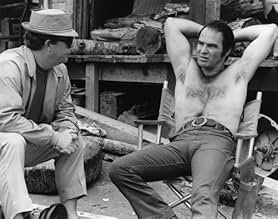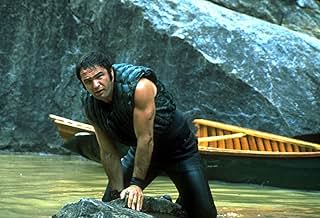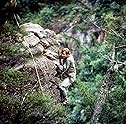In der Absicht, den Cahulawassee River noch einmal zu sehen, bevor dieser in einen riesigen See verwandelt wird, nimmt Outdoor-Fanatiker Lewis Medlock seine Freunde mit auf eine River-Raftin... Alles lesenIn der Absicht, den Cahulawassee River noch einmal zu sehen, bevor dieser in einen riesigen See verwandelt wird, nimmt Outdoor-Fanatiker Lewis Medlock seine Freunde mit auf eine River-Rafting-Tour durch die gefährliche amerikanische Wildnis, die sie nie vergessen werden.In der Absicht, den Cahulawassee River noch einmal zu sehen, bevor dieser in einen riesigen See verwandelt wird, nimmt Outdoor-Fanatiker Lewis Medlock seine Freunde mit auf eine River-Rafting-Tour durch die gefährliche amerikanische Wildnis, die sie nie vergessen werden.
- Für 3 Oscars nominiert
- 2 Gewinne & 14 Nominierungen insgesamt
Empfohlene Bewertungen
Watching Deliverance tonight put me in mind of the great Elia Kazan film The Wild River which was about the Tennessee Valley Authority building a dam that would bury a certain island under water in the middle of the Tennessee River. On that island was a clan that was headed by Jo Van Fleet. In the end all they could do was move and Van Fleet die as the water swallowed up their homes and way of life.
The same thing is happening in Deliverance as four executives from Atlanta decide go on a fishing trip one last time two a river that's about to overflow its banks when a dam is being built. A whole town and a way of life is to be summarily wiped out and the locals aren't taking to kindly to city folks even they're from Atlanta and talk kind of like they do. These people might as well be from Mars. In fact in Georgia a certain governor named Gene Talmadge encouraged that kind of division with his county unit rule so that one had to get a majority of counties including the hillbilly ones in order to gain state office. The poor white trash that dominated in these counties had a stranglehold on the politics of Georgia for a generation and a half.
The four vacationers, Jon Voight, Burt Reynolds, Ned Beatty, and Ronny Cox get put through all kinds of hell by some of the locals when out on the river. It gets good and personal and draw your own conclusions there. In the end it's a fight for survival.
Director John Boorman wisely chose to opt for realism in telling this savage tale. He shot Deliverance on location in the wilds of rural Georgia and used some of the real population as extras to give it a proper flavor. The four leads all perform well and Ronny Cox and Ned Beatty made great big screen debuts that insured both long careers.
And there's that Dueling Banjos theme which is actually a guitar and a banjo and once heard will reverberate forever.
The same thing is happening in Deliverance as four executives from Atlanta decide go on a fishing trip one last time two a river that's about to overflow its banks when a dam is being built. A whole town and a way of life is to be summarily wiped out and the locals aren't taking to kindly to city folks even they're from Atlanta and talk kind of like they do. These people might as well be from Mars. In fact in Georgia a certain governor named Gene Talmadge encouraged that kind of division with his county unit rule so that one had to get a majority of counties including the hillbilly ones in order to gain state office. The poor white trash that dominated in these counties had a stranglehold on the politics of Georgia for a generation and a half.
The four vacationers, Jon Voight, Burt Reynolds, Ned Beatty, and Ronny Cox get put through all kinds of hell by some of the locals when out on the river. It gets good and personal and draw your own conclusions there. In the end it's a fight for survival.
Director John Boorman wisely chose to opt for realism in telling this savage tale. He shot Deliverance on location in the wilds of rural Georgia and used some of the real population as extras to give it a proper flavor. The four leads all perform well and Ronny Cox and Ned Beatty made great big screen debuts that insured both long careers.
And there's that Dueling Banjos theme which is actually a guitar and a banjo and once heard will reverberate forever.
You plan a trip, along a river, in two canoes, a tricky navigation, but you'll get through, Lewis knows about these things, how the world revolves and spins, what could possibly go wrong, enjoy the view. Part way down you're separated and you moor, you and Bobby meet two locals and endure, an assault that makes one jig, as Bobby squeals like a split pig, it leaves you outraged, full of disgust and rancour. The situation takes a turn because of Lewis, as he saves you from the gorge that's now an abyss, you escape and speed down river, this adventure's not delivered, these are times, you will not fondly reminisce.
As good as it was all those years ago, and perhaps even better as it's aged, with four great performances, that to this day, would leave you contemplative when adventuring in certain under explored parts of the country.
As good as it was all those years ago, and perhaps even better as it's aged, with four great performances, that to this day, would leave you contemplative when adventuring in certain under explored parts of the country.
I first saw this on a vhs in the 90s, then on a vcd in 2006 n finally on a blu-ray. It's an extremely disturbing film especially the scene with Ned Beatty. One of the best backwoods/survival film of all time.
The film's awesome scenery, the sounds of birds, reptiles n insects n the gushing wild rivers combined with the absence of civilization are characters themselves.
We get to see Jon Voight doing some daredevil rock climbing and Burt Reynolds in his sleeveless t shirt flaunting biceps.
John Boorman has created one of the best movies based on James Dickey's novel. Indeed an influential movie. The banjo scene n the music is terrific.
I hadn't seen this movie in at least 20 years, but in the last few, it had started to itch away at my mind. I thought it terrific when I first saw it, but had I missed something even so? Was it more than just a disturbing adventure movie, in which city people run afoul of backwoodsmen?
So as soon as I saw the DVD, I bought it, even though it was obviously another Warner Bros. rush-it-out, never-mind-the-extras job.
The movie isn't as good as I remembered -- it's better. Those who are looking for a RIVER WILD thriller, or a SOUTHERN COMFORT (a DELIVERANCE imitation) suspense movie, are already looking in the wrong place. This movie is about what goes on inside people much more than it is about what goes on >around< them.
I've seen comments here suggesting that Ned Beatty doesn't show enough reaction after being brutally raped. Huh? He's stunned for ten minutes, then tries to attack Bill McKinney's >corpse<. He's still rattled the last time we see him in the movie, when he tells Jon Voight that they won't be seeing each other for a while. (Which clearly means forever.) Beatty's life has been changed; he'll never get over it.
So has Voight's, but in a different way. For the first time, I noticed that >three< people get into the tow truck when Reynolds hires those brothers to drive their cars to the canoeist's destination. Sure, that's logical -- there are three vehicles to drive initially, after all. But why does Boorman take pains to avoid showing us the face of the third person in the tow truck, but does show him fingering the gun in the rear window of the truck?
Could it be because this guy turns up later? Is he Bill McKinney's character? Or the Toothless guy? Or the guy Voight kills? Which of course raises the most important questions in the movie: WAS Ronny Cox shot? And if he was, was the guy Voight kills the one who shot him? (And was Voight's victim the Toothless guy?) On an initial viewing of the movie, all this seems pretty obvious: yes, Cox is shot; yes, Voight kills the right person, the Toothless guy.
But then what about the man we later learn has gone hunting but who hasn't returned? Why is Voight so shocked when he looks into the mouth of his victim? Boorman and Dickey give great weight to the scene in which Voight fails to kill a deer. (Even if he had, it would have been a foolish, wasteful act.) The interplay between Voight and Reynolds is also very interesting; Voight clearly admires Reynolds on some levels, while finding him disgusting on others.
Dickey is primarily a poet, secondarily a novelist; it's not hard to believe that he intended all four men to represent different aspects of the human condition. DELIVERANCE is one of the most intricately ambiguous movies of its type ever made; it cannot be pulled apart into easily-understood sections, and where our sympathies should lie is never obvious. Even the sheriff, played by Dickey himself, has darker shadings that are partly inexplicable. And there is that shot of the removal of the graves; it's not in there by chance or for local color.
On the surface, DELIVERANCE seems to be an exciting, disturbing adventure -- and it is that. But just like the secrets the lake conceals, there's a great deal more beneath the surface of DELIVERANCE.
So as soon as I saw the DVD, I bought it, even though it was obviously another Warner Bros. rush-it-out, never-mind-the-extras job.
The movie isn't as good as I remembered -- it's better. Those who are looking for a RIVER WILD thriller, or a SOUTHERN COMFORT (a DELIVERANCE imitation) suspense movie, are already looking in the wrong place. This movie is about what goes on inside people much more than it is about what goes on >around< them.
I've seen comments here suggesting that Ned Beatty doesn't show enough reaction after being brutally raped. Huh? He's stunned for ten minutes, then tries to attack Bill McKinney's >corpse<. He's still rattled the last time we see him in the movie, when he tells Jon Voight that they won't be seeing each other for a while. (Which clearly means forever.) Beatty's life has been changed; he'll never get over it.
So has Voight's, but in a different way. For the first time, I noticed that >three< people get into the tow truck when Reynolds hires those brothers to drive their cars to the canoeist's destination. Sure, that's logical -- there are three vehicles to drive initially, after all. But why does Boorman take pains to avoid showing us the face of the third person in the tow truck, but does show him fingering the gun in the rear window of the truck?
Could it be because this guy turns up later? Is he Bill McKinney's character? Or the Toothless guy? Or the guy Voight kills? Which of course raises the most important questions in the movie: WAS Ronny Cox shot? And if he was, was the guy Voight kills the one who shot him? (And was Voight's victim the Toothless guy?) On an initial viewing of the movie, all this seems pretty obvious: yes, Cox is shot; yes, Voight kills the right person, the Toothless guy.
But then what about the man we later learn has gone hunting but who hasn't returned? Why is Voight so shocked when he looks into the mouth of his victim? Boorman and Dickey give great weight to the scene in which Voight fails to kill a deer. (Even if he had, it would have been a foolish, wasteful act.) The interplay between Voight and Reynolds is also very interesting; Voight clearly admires Reynolds on some levels, while finding him disgusting on others.
Dickey is primarily a poet, secondarily a novelist; it's not hard to believe that he intended all four men to represent different aspects of the human condition. DELIVERANCE is one of the most intricately ambiguous movies of its type ever made; it cannot be pulled apart into easily-understood sections, and where our sympathies should lie is never obvious. Even the sheriff, played by Dickey himself, has darker shadings that are partly inexplicable. And there is that shot of the removal of the graves; it's not in there by chance or for local color.
On the surface, DELIVERANCE seems to be an exciting, disturbing adventure -- and it is that. But just like the secrets the lake conceals, there's a great deal more beneath the surface of DELIVERANCE.
I think one of the words that most describes the events in this film to me is brutal. When I saw this as a young lad, I felt the isolation of the four characters, cut-off from the world they are used to and thrown into a brutal world where nature is harsh (the rocks and canyons along the river always scare me) and the local folk are a complete world away. The film still scares the sh*t out of me! I mean, what would YOU do if you were confronted by two hill-billies in a situation like that?
It's so easy to remain distant and see the film as "entertainment", but take a reality-check and immerse yourself in the story. It's a shame some just don't appreciate the film - guess we're used to adrenaline-pumping action from start to finish nowadays, but that's too easy - it doesn't require emotional involvement from the viewer unlike a film such as Deliverance...
It's so easy to remain distant and see the film as "entertainment", but take a reality-check and immerse yourself in the story. It's a shame some just don't appreciate the film - guess we're used to adrenaline-pumping action from start to finish nowadays, but that's too easy - it doesn't require emotional involvement from the viewer unlike a film such as Deliverance...
Wusstest du schon
- WissenswertesWhile filming the white water canoeing scene, Ned Beatty was thrown overboard and was sucked under by a whirlpool. A production assistant dove in to save him, but he didn't surface for thirty seconds. Sir John Boorman asked Beatty, "How did you feel?," and Beatty responded, "I thought I was going to drown, and the first thought was, how will John finish the film without me? And my second thought was, I bet the bastard will find a way!"
- PatzerWhen the cedar strip canoe breaks in half ((01:02:35), it breaks cleanly, indicating it was previously cut. It would have split, splintered and hinged together by the canvas skin.
- Crazy CreditsThe end credits only show the cast and a notice of where the location of the film was shot and the special thanks, which rolls over a shot of Ed and his wife laying down trying to sleep. It also shows the shot of the lake where the hand ascended up out of the water and the final credit reads 'Distributed by WARNER BROS'
- Alternative VersionenThe original UK cinema version suffered minor BBFC cuts, including the removal of two lines of dialogue said by the toothless man when threatening Ed after the rape scene, "He got a real pretty mouth, ain't he?" and "You got to do some praying for me, boy, you better pray real good." Also, the death of the mountain man where he is seen struggling with the arrow through his chest was reduced. All later video releases were uncut.
- VerbindungenEdited into La classe américaine (1993)
- SoundtracksDuelling Banjos
Written by Arthur Smith (uncredited)
Arranged and played by Eric Weissberg, Steve Mandell
Top-Auswahl
Melde dich zum Bewerten an und greife auf die Watchlist für personalisierte Empfehlungen zu.
Details
Box Office
- Budget
- 2.000.000 $ (geschätzt)
- Weltweiter Bruttoertrag
- 4.550 $
- Laufzeit
- 1 Std. 49 Min.(109 min)
- Farbe
- Seitenverhältnis
- 2.35 : 1
Zu dieser Seite beitragen
Bearbeitung vorschlagen oder fehlenden Inhalt hinzufügen





































